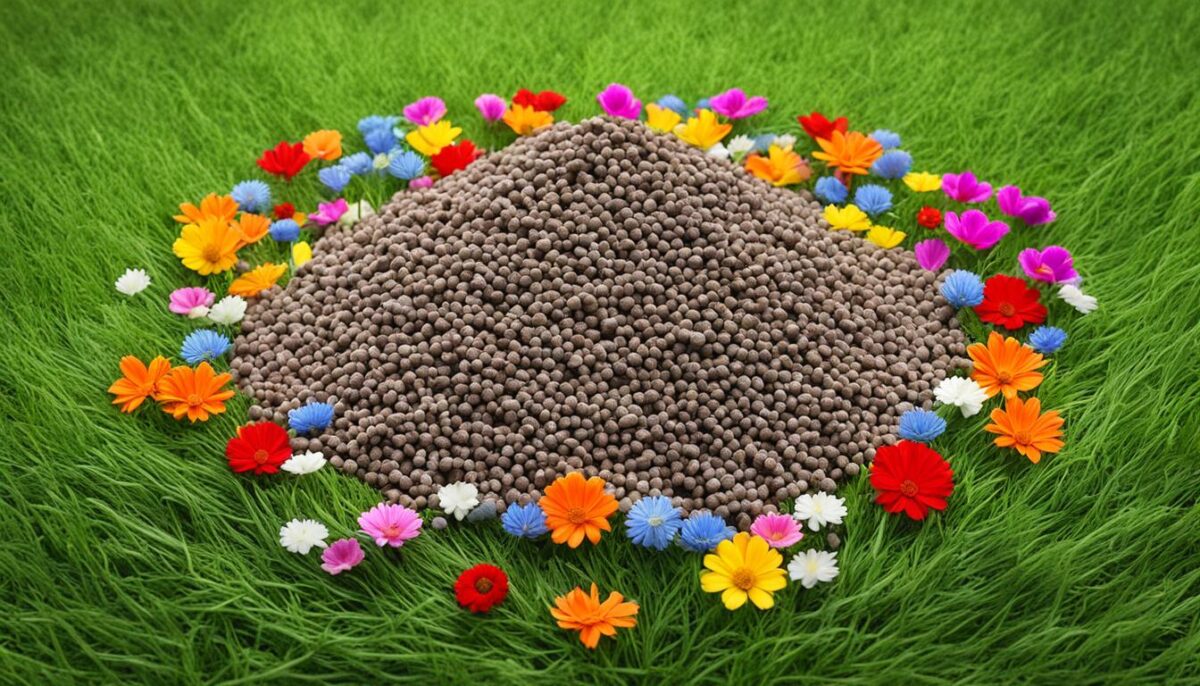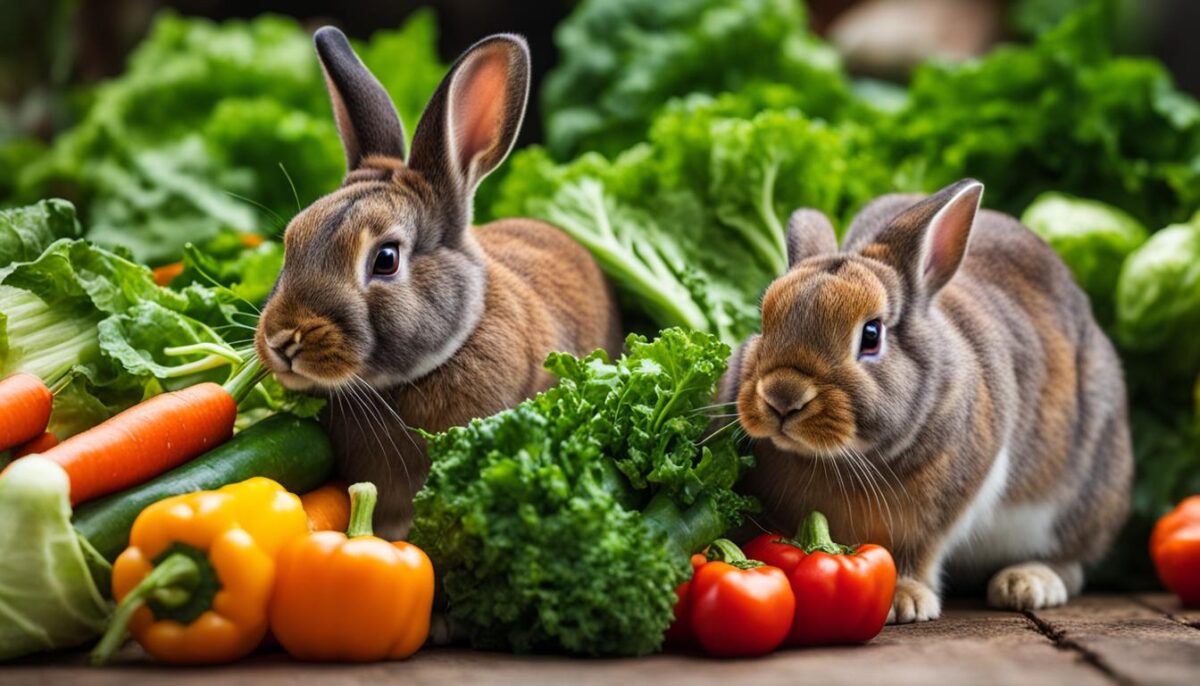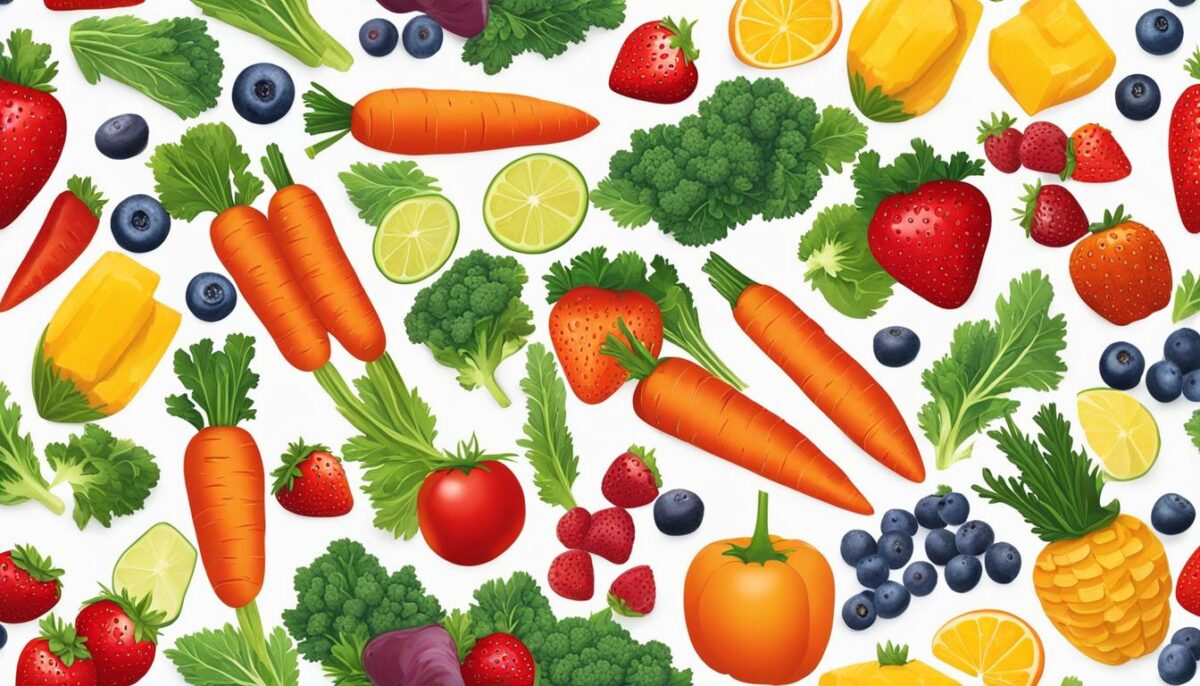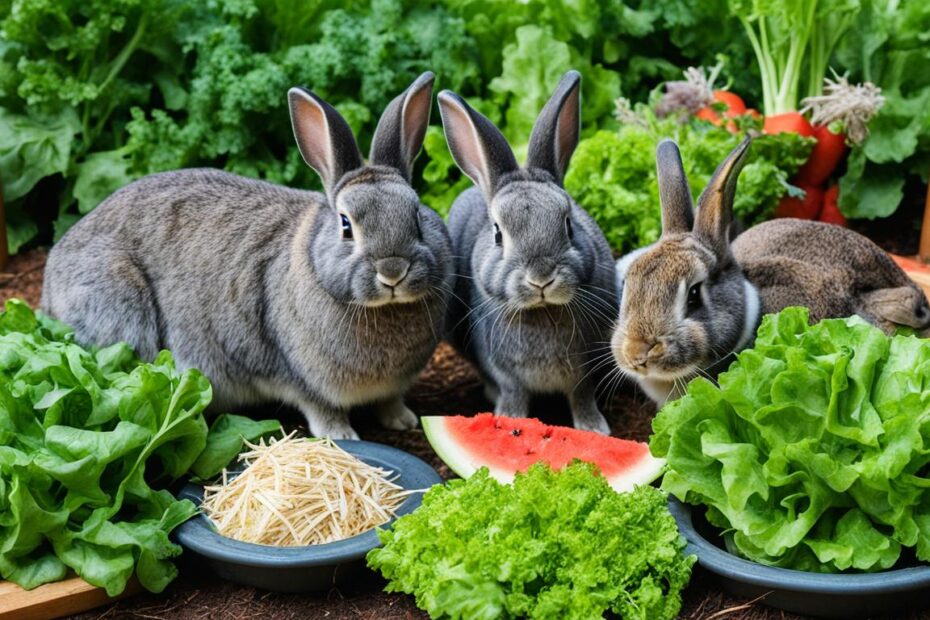When it comes to the diet of our furry friends, rabbits have specific nutritional needs that must be met to ensure their health and well-being. So, what should rabbits eat? Let’s explore the best food options for rabbits and provide you with a comprehensive rabbit feeding guide.
Key Takeaways:
- Rabbits require a balanced diet of hay, fresh veggies and fruit, and a few pellets.
- Hay should make up 80-90% of a rabbit’s diet, with grass hays like timothy, orchard grass, and brome being the best choices.
- A small amount of pellets can be given daily, and vegetables and fruits should be offered in moderation.
- Avoid feeding rabbits foods like potatoes, corn, beans, seeds, nuts, and chocolate.
- It is important to provide fresh water at all times.
The Importance of Hay in a Rabbit’s Diet
Hay plays a vital role in maintaining the health and well-being of rabbits. As herbivores, rabbits have unique dietary requirements, and hay is a crucial component of their nutritional needs. In fact, it should make up 80-90% of their daily food intake.
Why is hay so important for rabbits? Let’s explore the benefits:
1. Essential Fiber for Healthy Digestion
Rabbits have a sensitive digestive system that requires a high-fiber diet. Hay provides the necessary fiber to keep their digestive tract functioning properly. It aids in digestion, prevents gastrointestinal issues, and reduces the risk of gastrointestinal stasis, a potentially life-threatening condition in rabbits.
2. Dental Health Maintenance
Rabbits have continuously growing teeth, and chewing on hay helps naturally wear them down. By providing hay, you ensure that your rabbit’s teeth remain healthy and well-maintained.
3. Variety of Hay Choices
There are different types of hay available for rabbits, each with its unique qualities. Some popular grass hays for rabbits include:
- Timothy hay
- Orchard grass hay
- Brome hay
- Oat hay
These grass hays provide the necessary nutrients and fiber for rabbits. However, it’s important to note that alfalfa hay, while suitable for young rabbits and pregnant or lactating females, is not recommended for adult rabbits due to its high protein and calcium content.
4. Unlimited Access and Quality Control
Rabbits should have unlimited access to fresh hay at all times. It should be the backbone of their diet and readily available for them to nibble on throughout the day. When selecting hay, ensure it is free from mold, dust, or contaminants. High-quality hay ensures that your rabbit receives the full nutritional benefits.
To emphasize the importance of hay in a rabbit’s diet, let’s take a look at the table below, which showcases the nutritional composition of different types of hay:
| Type of Hay | Fiber Content (%) | Protein Content (%) | Calcium Content (%) |
|---|---|---|---|
| Timothy Hay | 32-36 | 7-12 | 0.25-0.5 |
| Orchard Grass Hay | 28-32 | 7-12 | 0.25-0.5 |
| Brome Hay | 15-25 | 8-10 | 0.3-0.5 |
| Oat Hay | 20-22 | 8-12 | 0.35-0.45 |
Note: The nutritional composition may vary slightly depending on factors such as growing conditions and harvesting.
As you can see, hay is a rich source of fiber, provides essential nutrients, and helps maintain a rabbit’s overall health. By ensuring that your rabbit’s diet is predominantly hay-based, you are promoting their well-being and helping them thrive.

The Benefits of Rabbit Pellets
Rabbit pellets are specially formulated to provide a balanced mix of essential nutrients for rabbits. They typically contain a combination of grains, legumes, and hay. These pellets can be a convenient way to ensure your rabbit receives certain vitamins and minerals.
When choosing rabbit pellets, opt for high-quality brands that have a high fiber content. Look for pellets that are specifically formulated for rabbits, as they will have the right balance of nutrients. Avoid pellets that contain dried corn, nuts, and seeds, as these can be harmful to rabbits.
Additionally, it’s important to feed pellets in small quantities. Adult rabbits only need about 1/4 cup of pellets per day, while younger rabbits can be given alfalfa pellets. Pellets should not make up a significant portion of a rabbit’s diet and should be complemented with hay and fresh vegetables.
Avoiding Overfeeding
Feeding your rabbit too many pellets can lead to health problems. Overconsumption of pellets can cause obesity and dental issues in rabbits. It’s crucial to remember that hay should be the main component of a rabbit’s diet, as it provides essential fiber and helps wear down their teeth naturally.
Here’s a recommended feeding guide for rabbit pellets:
| Rabbit Age | Pellet Type | Quantity |
|---|---|---|
| Adult | Timothy-based pellets | 1/4 cup per day |
| Youth | Alfalfa-based pellets | According to the manufacturer’s instructions |
Remember, always consult with your veterinarian for specific feeding recommendations based on your rabbit’s age, weight, and health condition.
In summary, rabbit pellets should be regarded as a supplement to a well-rounded diet that consists primarily of hay. Choose high-quality pellets with a high fiber content, and feed them in moderation. Pair pellets with fresh vegetables and a plentiful supply of hay to ensure your rabbit’s nutritional needs are met.
Feeding Rabbits Vegetables and Fruits
Vegetables and fruits are an important part of a rabbit’s diet, providing essential nutrients and variety. However, it’s crucial to feed them in moderation to maintain a balanced diet for your furry friend.
Rabbits can have up to 2 cups of fresh vegetables daily. For dwarf breeds and rabbits weighing under 5 pounds, 1 cup of vegetables is sufficient. When selecting vegetables for your rabbit, opt for safe options such as:
- Bell peppers
- Bok choy
- Carrot tops
- Cucumber
- Lettuce varieties (avoid iceberg lettuce)
It’s important to introduce new vegetables gradually, monitoring your rabbit for any digestive issues or signs of allergies. Remember, every rabbit is unique, and individual preferences may vary. Observe your rabbit’s reactions to different vegetables and adjust accordingly.
In addition to vegetables, fruits can be given to rabbits once or twice a week. When offering fruits, consider the serving size based on your rabbit’s body weight. Suitable fruits include small portions of:
- Apples
- Berries
- Bananas
- Peaches
- Melons
Always remove any seeds or pits from fruits before giving them to your rabbit, as they can be harmful. Like vegetables, it’s essential to introduce fruits slowly and monitor your rabbit’s response.
Remember to wash vegetables and fruits thoroughly before feeding them to your rabbit to remove any pesticides or contaminants. Providing a variety of vegetables and fruits ensures a well-rounded diet and adds enrichment to your rabbit’s meals.

Healthy Treats for Rabbits
Treats can be a special way to bond with your rabbit and provide them with a little extra enjoyment. However, it’s important to choose treats that are beneficial and safe for their health. Here are some healthy treat options for rabbits:
1. Fresh or Freeze-Dried Fruit
Key Keywords: rabbit treats, healthy treats for rabbits
Small pieces of fresh or freeze-dried fruit can be excellent treats for rabbits. Strawberries, apples, and bananas are popular choices that rabbits love. These fruits are not only tasty but also provide essential vitamins and minerals. Remember to offer fruits in moderation to prevent overconsumption of sugar.
2. Natural Mixes with Hay and Dried Flowers
Key Keywords: rabbit treat options, healthy treats for rabbits
Natural, unprocessed mixes that include hay and dried flowers are another great option for rabbit treats. These mixes provide a combination of textures and flavors that can keep rabbits entertained and satisfied. They also mimic a more natural diet, which is beneficial for their overall well-being.
3. Homemade Snacks
Key Keywords: safe treats for rabbits, rabbit treat options
If you’d like to get creative, you can make your own rabbit treats at home. There are many simple recipes available online that use rabbit-safe ingredients, such as oats, fresh veggies, and herbs. Homemade treats allow you to have better control over the ingredients and ensure that they are free from additives and preservatives.
4. Store-Bought Treats
Key Keywords: rabbit treats, safe treats for rabbits
If you prefer to buy treats from a store, it’s essential to read the ingredients carefully. Look for treats that are made specifically for rabbits and avoid those that contain added sugars, preservatives, and artificial colors. Some reputable brands offer a variety of healthy, rabbit-friendly treats that you can safely give to your furry friend.
| Treat Option | Description |
|---|---|
| Fresh or Freeze-Dried Fruit | Small pieces of fresh or freeze-dried fruit provide essential vitamins and minerals. |
| Natural Mixes with Hay and Dried Flowers | These mixes offer a combination of textures and flavors that mimic a more natural diet. |
| Homemade Snacks | Recipes using rabbit-safe ingredients like oats, fresh veggies, and herbs can be made at home. |
| Store-Bought Treats | Choose treats made specifically for rabbits and avoid those with added sugars and artificial additives. |
Remember, treats should only make up a small part of your rabbit’s diet. Overfeeding treats can lead to weight gain and other health issues. Always provide your rabbit with a balanced diet that primarily consists of hay, fresh vegetables, and a small amount of pellets. With the right treats and a balanced diet, your rabbit will stay happy and healthy!

Foods to Avoid Feeding Rabbits
When it comes to feeding your pet rabbit, it’s important to be aware of the foods that can be harmful to their health. Some foods are toxic to rabbits or can cause digestive issues, so it’s crucial to understand what not to feed them. Here are some foods that should be avoided:
- Beans
- Cabbage
- Cauliflower
- Chocolate
- Corn
- Crackers
- Iceberg lettuce
- Potatoes
- Rhubarb
- Seeds
- Yogurt
These foods can be difficult for rabbits to digest and may lead to serious health problems. It is crucial to be aware of these restrictions to ensure the well-being of your furry friend.
Always prioritize your rabbit’s health and follow a proper diet to keep them happy and thriving.
Conclusion
Providing a healthy and balanced diet is essential for the well-being of pet rabbits. By following a few simple guidelines, you can ensure that your furry friend receives the nutrition they need to thrive.
The foundation of a rabbit’s diet should be high-quality hay, such as timothy, orchard grass, or brome. This provides the necessary fiber for proper digestion and helps maintain their dental health. Hay should make up 80-90% of their daily food intake.
In addition to hay, rabbits should be offered a variety of fresh vegetables and fruits. These provide essential vitamins and minerals that contribute to overall health. However, it’s important to remember that moderation is key. Too many vegetables and fruits can lead to digestive issues.
Pellets can be given as a supplement to a rabbit’s diet, but they should only make up a small portion of their daily intake. Look for pellets with a high fiber content and avoid those that contain added sugars or unnecessary fillers.
Lastly, it’s crucial to avoid feeding rabbits toxic or harmful foods. This includes items like chocolate, beans, and potatoes, which can be dangerous to their health.
By following these guidelines and providing fresh water at all times, you can ensure that your rabbit has a healthy and nourishing diet. Remember, a well-fed rabbit is a happy rabbit!
FAQ
What should rabbits eat?
Rabbits should have a diet that consists mainly of hay, with fresh vegetables, pellets, and fruits being offered in moderation.
What is the best food for rabbits?
The best food for rabbits is hay, specifically grass hays like timothy, orchard grass, and brome. These provide essential fiber for digestion.
How much hay should a rabbit eat?
Hay should make up 80-90% of a rabbit’s diet. They should have unlimited access to fresh grass hay throughout the day.
Can adult rabbits eat alfalfa hay?
No, alfalfa hay is not recommended for adult rabbits due to its high protein and calcium content.
How many pellets should I feed my rabbit?
Adult rabbits only need about 1/4 cup of pellets daily, while younger rabbits can be given alfalfa pellets.
What should I look for in rabbit pellets?
Choose pellets with a high fiber content and avoid ones that contain dried corn, nuts, and seeds.
How many vegetables and fruits can rabbits have?
Rabbits can have up to 2 cups of fresh vegetables daily, with smaller portions recommended for dwarf breeds and rabbits under 5 pounds.
What vegetables and fruits are safe for rabbits?
Safe vegetables for rabbits include bell peppers, bok choy, carrot tops, cucumber, and various lettuce varieties. Fruits should be given in moderation, with appropriate serving sizes based on the rabbit’s weight.
Can rabbits have treats?
Yes, but treats should be given sparingly and should be healthy options, such as small pieces of fresh or freeze-dried fruit. Avoid treats with added sugars, preservatives, and artificial colors.
What foods should I avoid feeding my rabbit?
Avoid feeding rabbits foods like potatoes, corn, beans, seeds, nuts, and chocolate as they can be difficult for them to digest and may cause health problems.
How can I ensure my rabbit has a healthy diet?
Provide a balanced diet of hay, fresh vegetables, pellets, and occasional fruits. Avoid toxic and harmful foods, and always provide fresh water.


